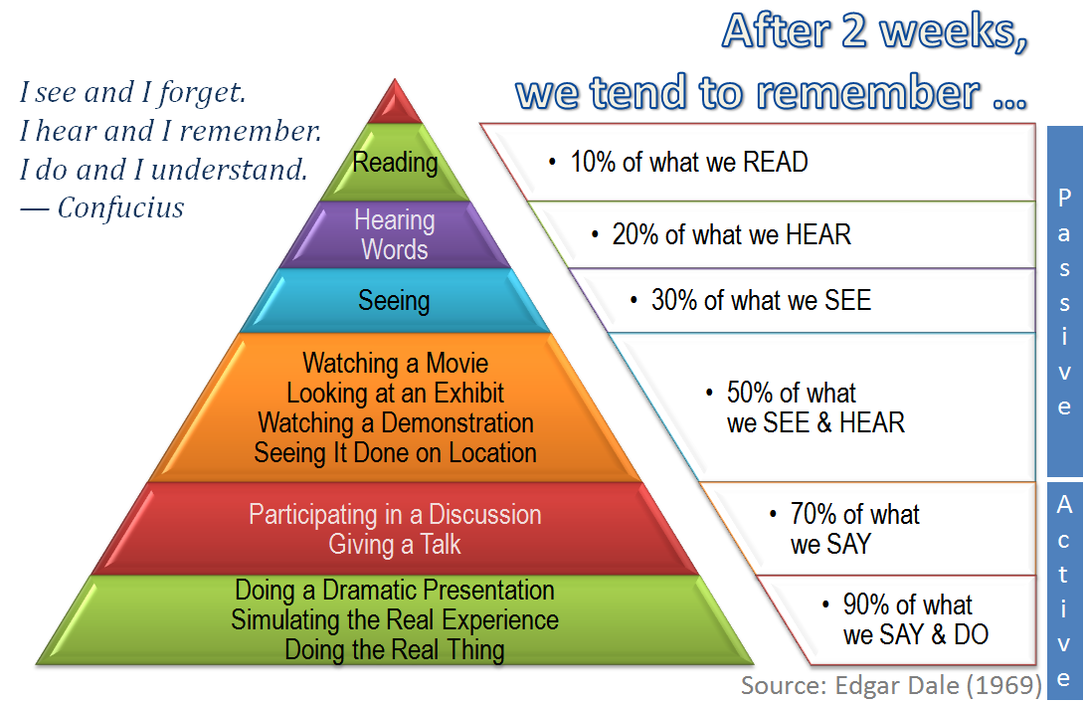
“Learners retain only 5 percent of what they hear and 10 percent of what they read, but they remember more than 50 percent of what they learn through discussion and interaction” – Josh Bersin.
Josh Bersin, founder of Bersin, a leading provider of research in human resources, talent, and learning, believes that most learning comes from experience. He reinforced the main findings of the 70-20-10 model, a paradigm that states that 70% of what people learn comes from experience, 20% from social interactions, and 10% purely from traditional learning such as readings and case studies. Despite the lack of evidence, the 70-20-10 learning development model has a common-sense rule of thumb – that most learning does take place on the job.
Following this model, business simulations, and interactive learning tools that replicate real-world experiences, allow us to train and develop business acumen in a risk-free environment. Business simulations are the bridge between learning and real-life challenges.
To engage students, business simulations can take the form of video games. More than half of Americans play video games, with the rest of the world showing equal signs of interest. Business simulation games seem to offer the right balance between education and fun. They are a specialized form of experiential learning by tapping into students’ love of gamified environments.
Business simulations provide a setting for students to bridge theories and concepts taught in class with real-life experiences. Within this environment, students are engaged with running their simulated firm, making all key strategic decisions, while competing against other business-savvy players. Students find business simulations a memorable learning experience, where they learn to interpret market feedback, analyze competitors’ moves, and make quick adjustments to their strategy.
To summarize, here are 6 reasons why business simulation games benefit students:
1. Risk-free decision making
A business simulation game recreates real-world business decision-making so that learners can practice in a risk-free simulated learning environment. Students are encouraged to try out different strategies, observe the results, monitor market fluctuations, and then pivot their direction, all without real-life repercussions.
2. Competitive multiplayer environment
Students tend to prefer an environment where they get to interact with other players in either a cooperative or competitive fashion. Business simulation games make learning fun by providing high levels of interaction, which engages learners, increases retention, and allows them to meet like-minded individuals from all over the world.
3. Application of theory
Another appeal of many games is their real-time feedback on decisions made, which allows one to practice many different strategies in a short time to discover what works best. This not only makes them more engaging but helps students to put into practice the theories they learn in class, creating stickiness.
4. In-game rewards
Just like in traditional games, business simulation games also reward players with leaderboard rankings and different financial indicators, including revenue, profit, and shareholder value growth. Analytics allow students to track the relationship between learning and results.
5. The big picture
By taking control of a business enterprise, participants see and understand how a business works from top to bottom, and so they tend to be better apt at grasping big-picture concepts. They get to play an actual job role and make many different choices regarding business strategy and day-to-day operational decisions.
6. Timing
Unlike in a real business environment, time is limited in most simulations. Students don’t have lots of time to make a decision. This can prove to be beneficial as it forces them to react under pressure, which stimulates creative thinking, and teaches them how to think on their feet and be able to make quick decisions.
No wonder there’s an increasing trend toward utilizing games at all levels of education. Check out the Virtonomics business games and empower your students through play and serious fun!
Rui Vasco Ramos

Startup simulator
Educational startup simulator. Learn to manage your startup, and scale your small business to a big company.

Tycoon game
Legendary free tycoon game. The most realistic free-scenario multiplayer economy simulation.

Economy game
The revolutionary economy game is about corporate wars, fierce competition, and industrial espionage.
 Business games
Business games  Бизнес игры
Бизнес игры  Juegos de negocios
Juegos de negocios  Geschäftsspiele
Geschäftsspiele  Jogos de negócios
Jogos de negócios  Giochi aziendali
Giochi aziendali  Jeux d'entreprise
Jeux d'entreprise  Trò chơi kinh doanh
Trò chơi kinh doanh  ألعاب الأعمال
ألعاب الأعمال  Επιχειρηματικά παιχνίδια
Επιχειρηματικά παιχνίδια  Forretningsspil
Forretningsspil  משחקי עסקים
משחקי עסקים  商业游戏
商业游戏  비즈니스 게임
비즈니스 게임  Permainan perniagaan
Permainan perniagaan  Zakelijke spellen
Zakelijke spellen  Forretningsspill
Forretningsspill  Gry biznesowe
Gry biznesowe  Jocuri de afaceri
Jocuri de afaceri  İş oyunları
İş oyunları  Liiketoimintapelit
Liiketoimintapelit  Obchodní hry
Obchodní hry  Affärsspel
Affärsspel  ビジネスゲーム
ビジネスゲーム